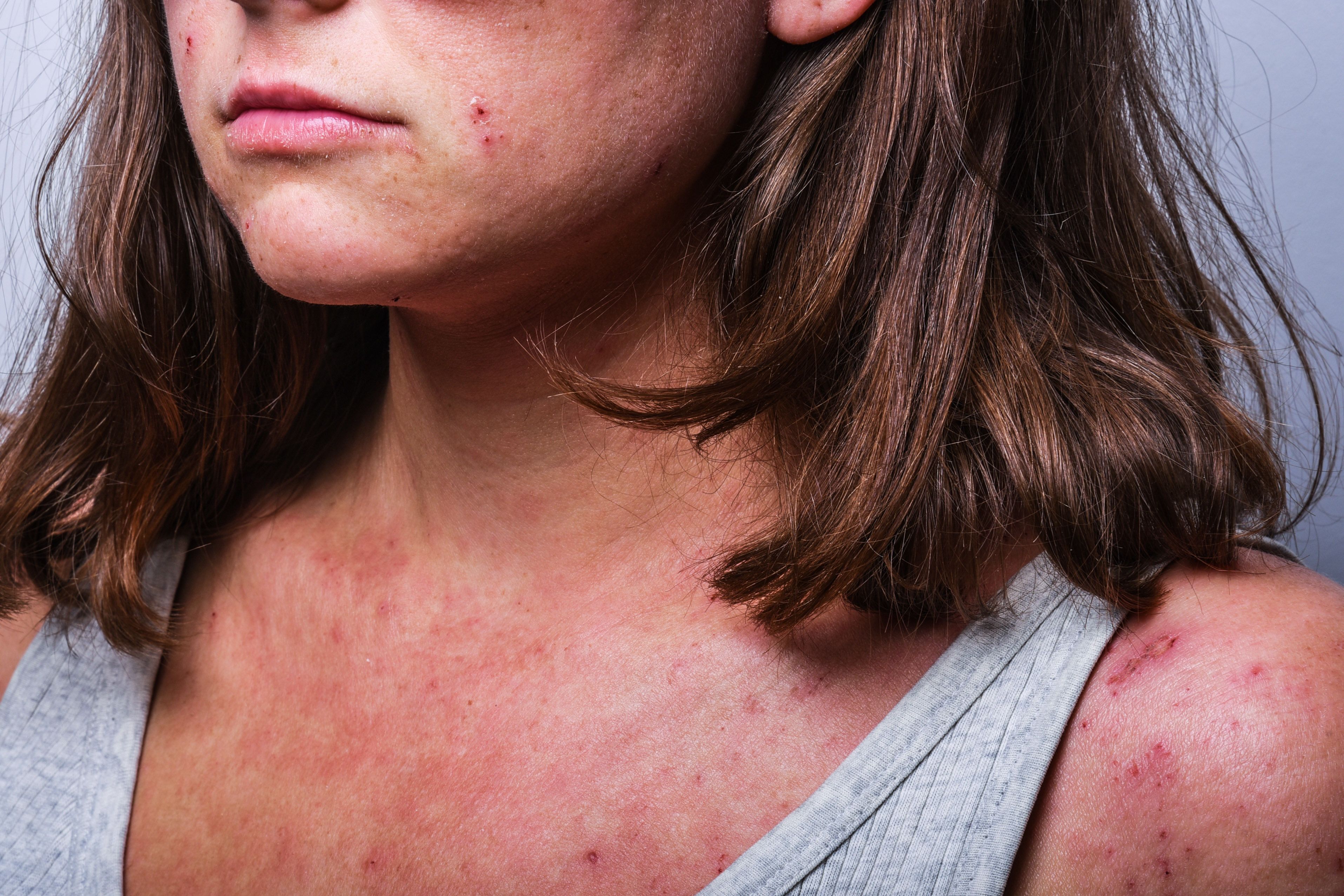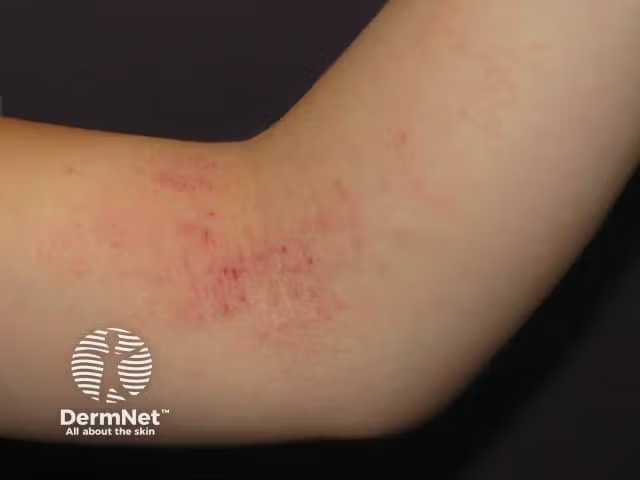- Case-Based Roundtable
- General Dermatology
- Eczema
- Chronic Hand Eczema
- Alopecia
- Aesthetics
- Vitiligo
- COVID-19
- Actinic Keratosis
- Precision Medicine and Biologics
- Rare Disease
- Wound Care
- Rosacea
- Psoriasis
- Psoriatic Arthritis
- Atopic Dermatitis
- Melasma
- NP and PA
- Skin Cancer
- Hidradenitis Suppurativa
- Drug Watch
- Pigmentary Disorders
- Acne
- Pediatric Dermatology
- Practice Management
- Prurigo Nodularis
- Buy-and-Bill
News
Article
Analyzing the Impact of AD on Women’s Sexual Health
Author(s):
A recent study found that AD not only affects mental health and QoL, but women’s sexual health and gestational desires as well.
Image Credit: © Ksenia Kirillovykh

Although there are numerous studies covering the Quality of Life (QoL) of patients with atopic dermatitis (AD),1 a group of researchers recently recognized a lack of information regarding its effects on women’s sexual health. The subsequent study found that AD not only affects women’s QoL, but also sexual health and overall gestational desire.2
Background
AD has been known to have an impact on patient's social, familial, and occupational functionalities,3 and like other skin diseases such as hidradenitis suppurativa, it has also been linked to sexual disfunction (SD).4 However, researchers noted little is known about the exact relationship between AD and SD. As for reproductive health, AD is the most common dermatosis during pregnancy,5 though many patients are undertreated during this period due to fear of adverse events.6
Study Methods
This cross-sectional study was conducted from February to March 2022. An online questionnaire was sent to women with self-referred diagnosis of AD to collect information such as: Patient-Oriented SCORing Atopic Dermatitis (PO-SCORAD), Dermatology Life Quality Index (DLQI), Patient Oriented Eczema Measure (POEM), and World Health Organization Quality of Life (WHOQOL), AD impact on sex life as measured using a numeric rating scale (NRS) (1 to 10), and the Female Sexual Function Index-6 (FSFI-6). Patients were also asked about the impact of AD on their reproductive desires, and psychological impact was measured with the Hospital Anxiety and Depression Scale (HADD and HADA) questionnaires.
Results
Researchers found the mean age of disease debut for participants (n=102) was 7.38 ± 10.24. The mean PO-SCORAD and POEM were found to be 55.52 ± 19.69 and 15.96 ± 6.73 respectively, reflecting severe disease. Researchers reported the mean DLQI score (18.47 ± 7.92) and the mean WHOQOL score (42.98 ± 20.29) as indicating a large impact of AD on patients’ QoL. They also observed a borderline increase in anxiety and depression in patients with AD through HADD (8.36 ± 4.56) and HADA (9.49 ± 4.19) scores.
Researchers found 68.6% of participants admitted that AD affected their sexual life. They reported the mean NRS as 5.23 ± 2.16 and the mean FSFI as 16.44 ± 8.99, which they wrote revealed an impairment of sexual life. The study noted women with gluteal (6.21 vs 4.63, p=0.007) and genital (6.59 vs 4.74, p=0.004) involvement showed greater values in NRS for SD.
Overall, researchers found 51% (52 out of 102) of the women thought their AD may influence their desire to reproduce. The study noted most of those who believe that AD had no influence on gestational desire were already married, and that significant impairment in gestational desire was also observed in those with gluteal disease. Of the 102-person sample, 32.4% (33 out of 102) of women already have 1 child, whereas 42.2% (43 out of 102) of them would like to have more. Only 28.9% (11 out of 38) of women reported talking with their dermatologist about their gestational desire.
Conclusion
During this study, researchers discovered a high mean DLQI score for patients with AD, reflecting a high impact on patients’ QoL. They also reported a borderline increasement of anxiety and depression in patients with AD through HAAD and HADA scales, further confirming previous reports.1,3 Researchers found that over 66% of women suffering from AD had SD, and that SD was directly associated with PO-SCORAD, number of affected areas, sleep, and gluteal and genital disease. Finally, the study revealed that women with gluteal disease were less willing to get pregnant but suggested that more studies are needed to confirm these results as well as explore the concerns of AD patients regarding pregnancy specifically.
Researchers noted that controllable factors, such as severity and extension of symptoms, enhance the impact AD has on QoL. They suggested that dermatologists may need to approach patients with AD in a more holistic way, with emphasis on psychological and social aspects such as sexuality and reproductive desires.
References
- Silverberg JI, Gelfand JM, Margolis DJ, et al. Patient burden and quality of life in atopic dermatitis in US adults: A population-based cross-sectional study. Ann Allergy Asthma Immunol. 2018;121(3):340-347. doi:10.1016/j.anai.2018.07.006
- Rodríguez-Pozo JA, Montero-Vílchez T, Diaz Calvillo P, et al. The impact of atopic dermatitis on sexual function and reproductive desires in women. Acta Derm Venereol. 2024;104:adv35107. Published 2024 Jun 11. doi:10.2340/actadv.v104.35107
- Hsieh BJ, Shen D, Hsu CJ, et al. The impact of atopic dermatitis on health-related quality of life in Taiwan. J Formos Med Assoc. 2022;121(1 Pt 2):269-277. doi:10.1016/j.jfma.2021.03.024
- Kaundinya T, Rakita U, Silverberg JI. Prevalence, predictors, and longitudinal course of sexual dysfunction in adults with atopic dermatitis. Dermatitis. 2023;34(3):233-240. doi:10.1097/DER.0000000000000938
- Lehrhoff S, Pomeranz MK. Specific dermatoses of pregnancy and their treatment. Dermatol Ther. 2013;26(4):274-284. doi:10.1111/dth.12078
- Babalola O, Strober BE. Treatment of atopic dermatitis in pregnancy. Dermatol Ther. 2013;26(4):293-301. doi:10.1111/dth.12074






